Personnel development
KMG’s corporate social responsibility policy fosters development across our operating regions. KMG complies with the legal and regulatory requirements applicable in the Republic of Kazakhstan, as well as with international laws and treaties regulating oil companies. We promote meritocracy, fairness, and integrity while providing every employee with a workplace conducive to new achievements and assessing their respective contributions to KMG’s overall success based on merit. We also foster a culture of understanding, engagement, and support of strategic, operational and production goals among our employees at all levels. Every year, KMG’s production companies invest significant amounts in local social and economic growth and infrastructure development across our operating regions in line with memoranda signed with local Akimats under subsoil use contracts.
The actual headcount for KMG Group (including subsidiaries, and 50% and more owned jointly controlled entities) was 70,938 at end-2019.
The percentage of locally hired top managers of subsidiaries, and 50% and more owned jointly controlled entities located in Kazakhstan is 86%.
The percentage of employees who are managers at all levels is 11.3% of the total headcount. 16.5% of managers are female and 83.5% are male.
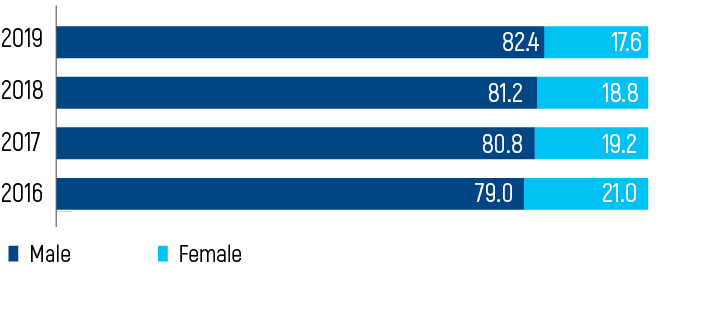
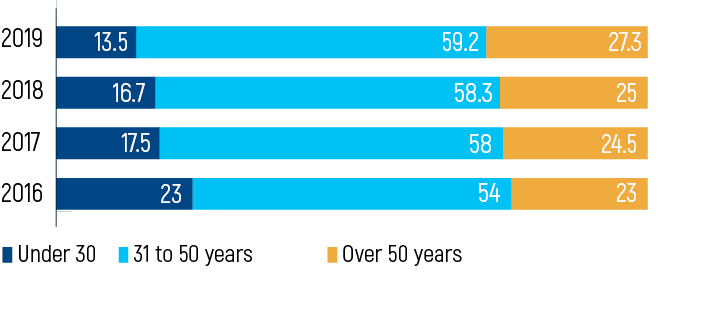
Priority areas of our social policy
Student engagement
Every year KMG offers practical training opportunities and pre-graduation internships to Kazakhstan university students.
In 2019, we hired three graduates of the Zhas Orken programme.
About 20 participants in our Digital Summer programme were offered summer intern positions across KMG Group, with four interns offered further employment with KMG in 2019.
Employee onboarding and training
Since 2019, KMG Group’s training concept has been focused on operational staff development, including both managers, engineering and technical personnel, and blue-collar workers. The KMG Corporate Centre together with KMG Engineering LLP developed and approved development programmes for operational staff jobs, such as Reservoir Engineer (in 2019 the programme covered 25 employees at production companies such as Ozenmunaigas JSC, Karazhanbasmunai JSC, Mangistaumunaigaz JSC, KMG Engineering LLP, Kazakhoil Aktobe LLP, and Kazakhturkmunay LLP).
Another focus in our employee upskilling and training programmes is our refinery modernisation effort, which requires relevant staff to improve their skills. In 2019, modular training was provided to Pavlodar Refinery employees on IBM Maxima and process management. We also ran bootcamps at Petromidia Refinery, Romania, to provide training in maintenance management to employees of Pavlodar Refinery, Atyrau Refinery, and Caspi Bitum.
Mandatory training programmes and upskilling courses remain our key training priority, with KMG Group spending a total of KZT 6.5 bln to train over 140 thous. employees in 2019. The number of trainees is calculated based on completed trainings (e.g. one employee completing two trainings counts as two trainees). Average academic hours of training per year per employee is 17.6 hours.
Collective bargaining agreements
KMG Group uses its own model of collective bargaining agreement setting out uniform policies covering compensation, social support, working conditions, work and rest hours, etc.
Relevant collective bargaining agreements are signed between the employer and employees at each company.
Collective bargaining agreements were signed at 36 production facilities. A total of 58,710 employees across KMG Group companies have been covered by collective bargaining agreements.
Trade unions
Employees of KMG Group companies may choose to set up a trade union at their own discretion.
KMG Group’s uniform internal communications framework requires the management team to hold consultations with the Group companies’ trade unions.
KMG Group has 40 trade unions, including shopfloor and local trade unions, which defend the interests of 55,657 employees.
Social support
KMG Group companies’ collective bargaining agreements and Rules for Rendering Social Support guarantee a uniform minimum benefits package and outline an additional benefits package recommended subject to the respective company’s financial position and negotiations between the employer and employees/trade unions.
Collective bargaining agreements at KMG facilities offer 35 types of social support for employees, their families, and unemployed retirees.
Motivation programmes
A uniform compensation system has been introduced across KMG’s E&P business segment companies to ensure consistency of compensation policies across all units and drive employee ownership of results. This system sets out a number of compensation payments, allowances, and additional entitlements payable subject to qualifying conditions, including a region-specific ratio, which is a percentage added to one’s salary to cover extra expenses and to compensate for tougher working environment in harsh-climate regions.
In 2019, KMG employees took part for the first time in an international skills competition hosted by TATNEFT. The purpose of the event was to share experiences, provide professional training, and strengthen ties between companies.
During the four days of the event, 182 employees from 26 KMG Group entities competed in different skill sets.
Promotion of healthy lifestyles
KMG annually holds a corporate sports competition across various disciplines.
A corporate sports competition was held in Shymkent in 2019. The qualification rounds involved over 3 thous. amateur athletes from 48 KMG subsidiaries. 350 employees from 26 KMG subsidiaries reached the finals.
Charity and sponsorship
All sponsorship and charitable programmes on behalf of Samruk-Kazyna JSC are run by Samruk-Kazyna Trust Social Development Foundation, assisted by public authorities, the Government of Kazakhstan, and experts in public and social policies.
In 2019, social investments under subsoil use contracts across KMG Group totalled KZT 7.6 bln.
During the year, KMG also allocated KZT 22.8 bln to develop infrastructure at Turkistan as instructed by the Government of the Republic of Kazakhstan (construction of a 7,000-seat stadium, a congress hall, and a 1,000-seat amphitheatre).
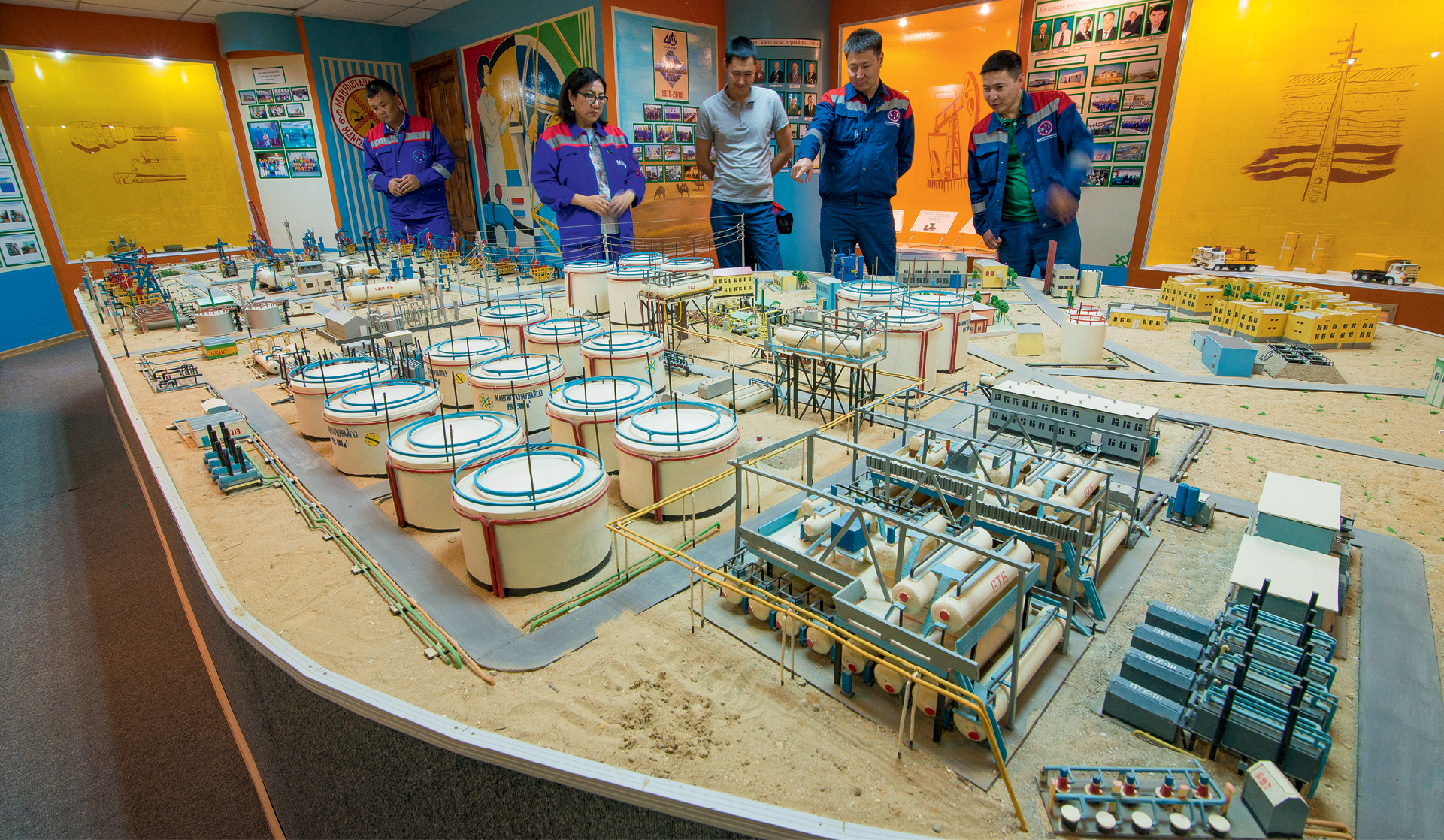
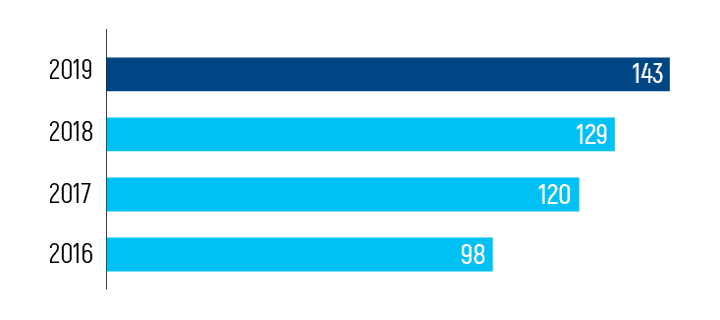
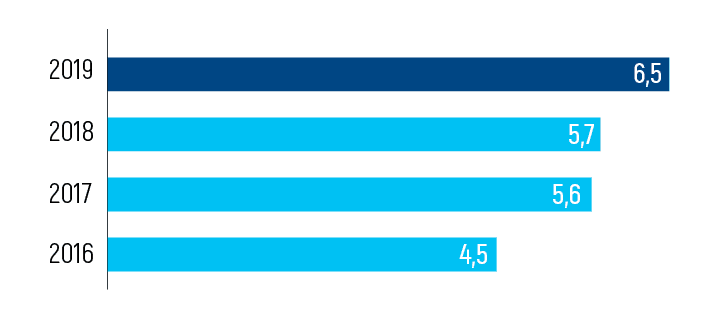
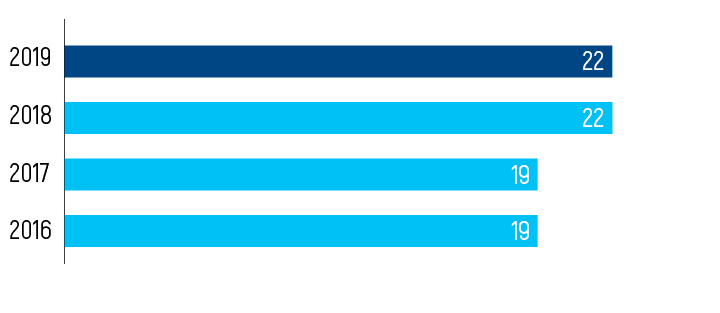
Average academic hours of training per year per employee is 17.6 hours.
The number of trainees is calculated based on completed trainings (e.g. one employee completing two trainings counts as two trainees).
Over 2019, KMG Group companies spent around KZT 22 bln on social support for their employees (2018: KZT 22 bln), including social support for unemployed retirees. An important share of the benefits package offered across KMG Group includes voluntary health insurance for employees and their families, maternity and childcare benefits, children’s education, help to large families, organisation of summer recreation for children, and additional compensations for employee leaves.
| Costs | Share, % |
|---|---|
| voluntary health insurance of employees and their families against the risk of illness | 22 |
| maternity and childcare benefits, children’s education, help to large families | 18 |
| organisation of summer recreation for children and additional compensation for employee leaves | 17 |
| social support for unemployed retirees | 7 |
| financial support for treatment/surgical procedures above the health insurance limit | 2 |
| financial support for purchasing school accessories by the start of the school year (1 September) | 3 |
| benefits paid to employees with disabled spouses or children with lifelong disabilities for the Day of Persons with Disabilities | 2 |
| Other types of social supportOther types of social support (financial assistance to the veterans of the Soviet-Afghan War for marriage, to employees who participated in the Chernobyl disaster response or were exposed to the Semipalatinsk Test Site, in connection with the death of an employee/close relatives, for the organisation of funerals; pregnancy and childbirth benefits; benefits paid to the family of an employee who died in an accident; assistance to employees in dire need; compensation of housing rent expenses to employees; free attendance of sports facilities; benefits paid to employees celebrating a jubilee; compensation of expenses for childcare institutions; benefits due to award winners; benefits paid for achieving a retirement age; increased sick pay; onboarding compensation; compensation of expenses for medicines; New Year presents for children). | 29 |
KMG Group has no gender pay and bonus gap. The pay level at KMG Group entities is linked to position rather than an individual employee, i.e. men and women holding the same position will receive the same pay and other bonuses under our corporate compensation policies. Our executives receive annual bonuses for achieving their annual KPIs, with quarterly bonuses paid to administrative staff for meeting their quarterly targets.